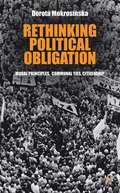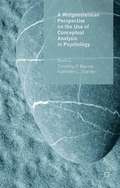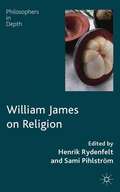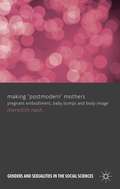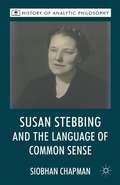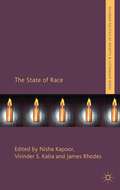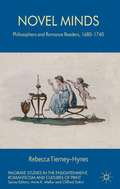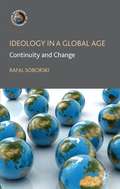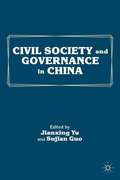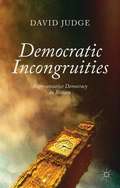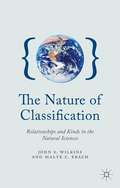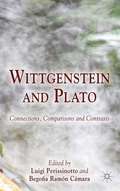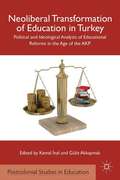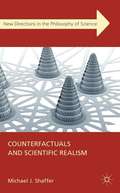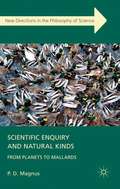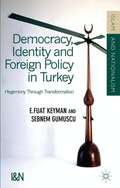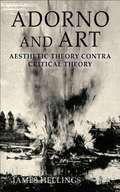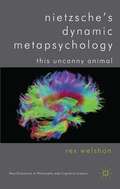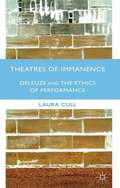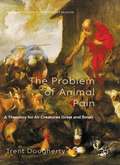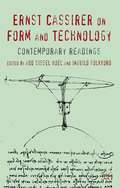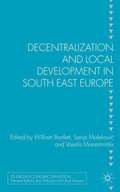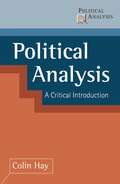- Table View
- List View
Rethinking Political Obligation
by Dorota MokrosinskaWhat are the grounds for and limits to obedience to the state? This book offers a fresh analysis of the debate concerning the moral obligation to obey the state, develops a novel account of political obligation and provides the first detailed argument of how a theory of political obligation can apply to subjects of an unjust state.
A Wittgensteinian Perspective On The Use Of Conceptual Analysis In Psychology
by Kathleen L. Slaney Timothy P. RacineThis edited volume includes contributions from internationally renowned experts in the philosophy of Ludwig Wittgenstein. It applies his later philosophy to concrete issues pertaining to the integrity of scientific claims in a broad spectrum of research domains within contemporary psychology.
William James on Religion
by Henrik Rydenfelt Sami PihlströmA team of international experts present a collection of articles on William James's philosophy of religion and its current relevance. A new look at his philosophy of religion is crucially important for the development of this field of inquiry today.
Making ‘Postmodern’ Mothers
by Meredith NashBased on interviews with pregnant women, this book provides a multi-disciplinary empirical account of pregnant embodiment and how it relates to wider sociological and feminist discourses about gender, bodies, 'fitness', 'fat', celebrity and motherhood.
Susan Stebbing and the Language of Common Sense
by Siobhan ChapmanThis first book-length study of the work and life of L. Susan Stebbing relates the development ofher thought to the philosophical, social and political background of her life. It also assesses Stebbing's contribution in the light of developments both in analytic philosophy and in linguistics in the decade since her death. "
The State of Race
by Virinder S. Kalra Nisha Kapoor James RhodesThis book analyses the nature of the contemporary racial state, exploring issues such as the nature of postraciality, racial neoliberalism, the state of multiculturalism and whiteness, alongside the functioning of state institutions and policy concerning the military, education, community surveillance, asylum and extradition.
Novel Minds
by Rebecca Tierney-HynesEighteenth-century philosophy owes much to the early novel. Using the figure of the romance reader this book tells a new story of eighteenth-century reading. The impressionable mind and mutable identity of the romance reader haunt eighteenth-century definitions of the self, and the seductions of fiction insist on making an appearance in philosophy.
Ideology in a Global Age
by Rafal SoborskiThis book challenges the popular view that established ideologies no longer make sense in today's globalizing world. Considered from a broad historical perspective, major ideological traditions have not become destabilized and incoherent by globalization, but remain meaningful political beliefs that shape the globalization debate.
Civil Society And Governance In China
by Sujian Guo Jianxing YuWritten by scholars from both inside and outside China, this wide-ranging collection of essays explores the complexity of the relationship between governance and civil society by combining theoretical exploration and empirical case studies based on the governance practice in China.
Democratic Incongruities
by David JudgeClear disparities exist between notions of representative democracy and political practice in Britain. Alternative models of democracy, however, have their own incongruities in trying to marry representation and democracy. This book analyses the mismatches in democratic theories and between theory and practice in British representative democracy.
The Nature Of Classification
by Malte C. Ebach John S. WilkinsDiscussing the generally ignored issue of the classification of natural objects in the philosophy of science, this book focuses on knowledge and social relations, and offers a way to understand classification as a necessary aspect of doing science.
Wittgenstein and Plato: Connections, Comparisons And Contrasts
by Luigi Perissinotto Begoña Ramón CámaraWittgenstein was a faithful and passionate reader of Plato's Dialogues as confirmed by writings and witnesses. Here well-known scholars of Wittgenstein and Plato illuminate the relationship between the two philosophers both philologically and philosophically, and provide new interpretation keys of two of the leading figures of Western thought.
Neoliberal Transformation of Education in Turkey: Political and Ideological Analysis of Educational Reforms in the Age of the AKP (Palgrave Macmillan’s Postcolonial Studies in Education)
by Güliz Akkaymak Kemal İnalNeoliberal policies have had an impact on educational systems globally. This book provides a detailed and critical analysis of neoliberal educational policies and reforms in Turkey by focusing on the Justice and Development Party's reform efforts over the last eight years.
Counterfactuals and Scientific Realism
by Michael J. ShafferScientific realism is the view that the sciences aim to discover scientific theories that are true, or at least approximately true. Scientific realism is widely accepted by both scientists and philosophers of science. However, in practice - and perhaps even in principle - scientists are forced to simplify theories by idealizing. Some more skeptical philosophers of science have questioned the acceptability of scientific realism because they claim that theories involving idealizations are not even approximately true. This book is an attempt to show that scientific realism is compatible with the presence of idealization in the sciences. The main contention of this book is that idealized theories can be treated as counterfactuals about how things are in worlds that are similar to but simpler than the actual world. So understood it is clear that they have perfectly ordinary truth conditions. This implies that scientific theories that incorporate idealizations can be true despite the objections of anti-realists.
Scientific Enquiry and Natural Kinds
by P. D. MagnusSome scientific categories seem to correspond to genuine features of the world and are indispensable for successful science in some domain; in short, they are natural kinds . This book gives a general account of what it is to be a natural kind and puts the account to work illuminating numerous specific examples.
Democracy, Identity, and Foreign Policy in Turkey
by E. Fuat Keyman Sebnem GumuscuThe recent history of Turkey is dominated by the country's transformation into a modern democracy. Over the past few years Turkey has been increasingly recognised as a nation of economic, political and cultural significance as well as being a vital political connection between Europe and the Middle East. In this compelling volume, Professor Keyman and Dr. Gumuscu put democratisation in Turkey under the microscope with an especial focus on recent transformations under the Justice and Development Party (AKP). Accordingly, it explores to what extent Turkey's transformation under the AKP has led to democratic consolidation as well as asking if there is a disconnect between economic, cultural, and urban transformation, on the one hand, and democratic consolidation on the other? Furthermore, this book also takes the opportunity to explore several issues that have a direct effect on the consolidation of Turkish democracy such as globalization, foreign policy activism, the kurdish question, religious governance and civil society. By critically analyzing the dialectic between domestic transformations and global/regional dynamics, the book also discusses the ways in which Turkish transformation is affected by the Arab uprisings as well as how Turkey may inspire these countries. "
Adorno and Art
by James HellingsA comprehensive, critical and accessible account of Theodor W. Adorno's materialist-dialectical aesthetic theory of art from a contemporary perspective, this volume shows how Adorno's critical theory is awash with images crystallising thoughts to such a degree that it has every reason to be described as aesthetic.
Theology and Marxism in Eagleton and Žižek: A Conspiracy of Hope
by Ola SigurdsonTaking its cue from the renewed interest in theology among Marxist and politically radical philosophers or thinkers, this study inquires into the reasons for this interest in theology focusing on the British literary theorist Terry Eagleton and the Slovenian philosopher and psychoanalyst Slavoj Žižek, as two contemporary prominent Marxist thinkers.
Nietzsche’s Dynamic Metapsychology
by Rex WelshonAn analysis and assessment of Nietzsche's metapsychology. Nietzsche is neither a dualist nor a physical reductionist about the mind. Instead, he is best interpreted as thinking that the mind is embodied and embedded in a larger natural and social environment with which it is dynamically engaged.
The Rise and Fall of Radical Westminster, 1780-1890
by Marc BaerThe Rise and Fall of Radical Westminster, 1780-1890 explores a critical chapter in the story of Britain's transition to democracy. Utilising the remarkably rich documentation generated by Westminster elections, Baer reveals how the most radical political space in the age of oligarchy became the most conservative and tranquil in an age of democracy.
Theatres of Immanence
by Laura CullTheatres of Immanence: Deleuze and the Ethics of Performance, now available in paperback, is the first monograph to provide an in-depth study of the implications of Gilles Deleuze's philosophy for theatre and performance. Engaging with a wide range of interdisciplinary practitioners including Goat Island, Butoh, Artaud, John Cage, the Living Theatre, Robert Wilson and Allan Kaprow, as well as with the philosophies of Deleuze and Guattari, Henri Bergson and Fran#65533;ois Laruelle, the book conceives performance as a way of thinking 'immanence': the open and endlessly creative whole of which all things are a part. Theatres of Immanence builds upon Deleuze's emphasis on immanence, affect, change and movement to provide new approaches to five key topics in theatre and performance: 1) authorship and collaboration, 2) voice and language, 3) animals in performance, 4) audience participation and 5) time or duration. The book provides an accessible introduction to Deleuze's ideas and draws attention to the ethical dimensions of performance, asking: 'what good is theatre, and particularly immanent theatre, anyway?
The Problem of Animal Pain
by Trent DoughertyAnimal suffering constitutes perhaps the greatest challenge to rational belief in the existence of God. Considerations that render human suffering theologically intelligible seem inapplicable to animal suffering. In this book, Dougherty defends radical possibilities for animal afterlife that allow a soul-making theodicy to apply to their case.
Ernst Cassirer on Form and Technology
by Aud Sissel Hoel Ingvild FolkvordErnst Cassirer's thought-provoking essay Form and Technology (1930) ascribes to technology a new dignity as a genuine tool of the mind in equal company with language and art. Translated here into English it is accompanied by critical essays that explore its current relevance.
Decentralization and Local Development in South East Europe
by Sanja Malekovic Vassilis MonastiriotisDecentralisation is changing the face of South East Europe. This book provides practical analysis of the devolutionary measures reshaping post-Communist economies. Using case studies from Croatia, the former Yugoslavia, Albania and more, this collection offers valuable insights into political and fiscal redistribution.
Political Analysis
by Colin Hay"Political Analysis" provides an accessible introduction to the analysis of political structures, institutions, ideas and behaviours and, above all, to the political processes through which they are constantly made and remade. ; Following an innovative introduction to the main approaches and concepts in political analysis, the text focuses thematically on the key issues which currently concern and divide political analysts, including the boundaries of the political the question of structure, agency and power the dynamics of political change the relative significance of ideas and material factors and the challenge posed by postmodernism which the author argues the discipline can strengthen itself by addressing without allowing it to become a recipe for paralysis.
